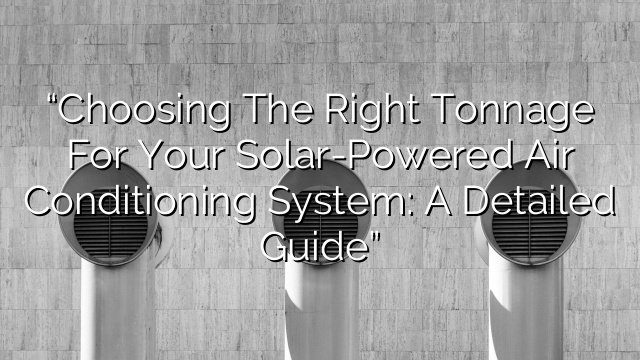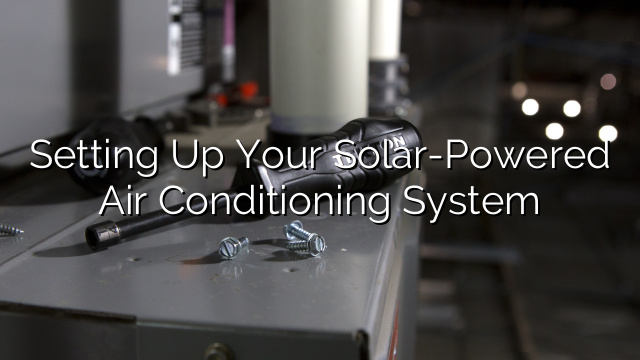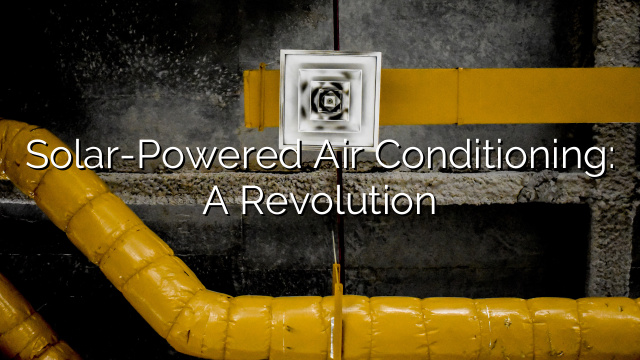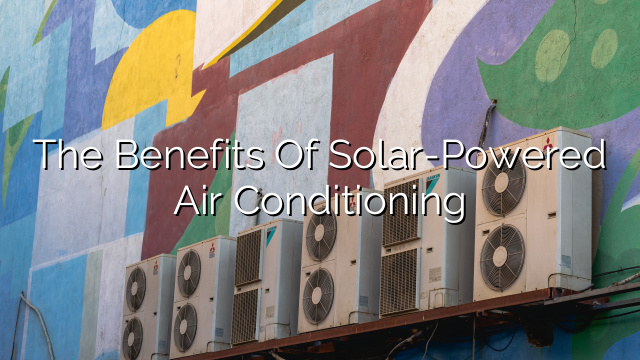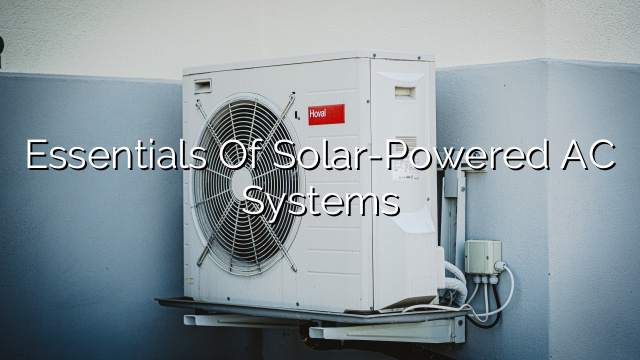Introduction
Solar-powered air conditioning systems are becoming increasingly popular as people look for more energy-efficient ways to cool their homes. These systems are not only environmentally friendly but also help reduce energy costs. When it comes to choosing the right tonnage for your solar-powered air conditioning system, it’s important to consider factors such as the size of your home, energy requirements, and environmental conditions. This guide will provide you with detailed information to help you make an informed decision.
Understanding Tonnage in Air Conditioning
Tonnage refers to the cooling capacity of an air conditioning system. It indicates the amount of heat that a system can remove from a space in one hour. One ton of cooling capacity is equal to removing 12,000 BTUs (British Thermal Units) of heat per hour. The more tonnage an air conditioning system has, the more cooling capacity it has.
Factors to Consider
When choosing the right tonnage for your solar-powered air conditioning system, there are several factors you need to consider:
- Size of Your Home: The size of your home plays a crucial role in determining the right tonnage. A larger home will require a system with higher tonnage as it will need more cooling capacity to efficiently cool the space.
- Insulation: The quality of insulation in your home affects the efficiency of your air conditioning system. A well-insulated home will require a lower tonnage system as it will retain cool air better.
- Climate: The climate in your region also affects the tonnage required. Areas with hotter climates will need air conditioning systems with higher tonnage to efficiently cool the space.
- Number of Occupants: The number of people living in your home also affects the cooling requirements. More occupants in a space generate more heat, requiring a higher tonnage system.
- Windows and Sunlight Exposure: The number and size of windows in your home and the amount of sunlight it receives impact the cooling requirements. Homes with large windows and more sunlight exposure may need a higher tonnage system.
Choosing the Right Tonnage
Once you have considered the above factors, you can use the following guidelines to choose the right tonnage for your solar-powered air conditioning system:
- 2 Ton: Suitable for small homes with an area of up to 1,200 square feet. Ideal for cooling single rooms or small apartments.
- 3 Ton: Suitable for average-sized homes with an area of up to 1,800 square feet. Can effectively cool multiple rooms.
- 4 Ton: Suitable for larger homes with an area of up to 2,400 square feet. Provides cooling for larger spaces or multiple floors.
- 5 Ton: Suitable for large homes with an area of up to 3,000 square feet. Ideal for cooling large spaces or multi-floor buildings.
It’s important to note that these are general guidelines, and you may need to consult with a professional to determine the right tonnage for your specific needs.
Benefits of Choosing the Right Tonnage
Choosing the right tonnage for your solar-powered air conditioning system offers several benefits:
- Efficiency: A system with the right tonnage will operate more efficiently, resulting in better cooling performance and reduced energy consumption.
- Comfort: An accurately sized system will cool your home more effectively, ensuring optimal comfort for you and your family.
- Cost Savings: An appropriately sized system will help you save on energy costs by avoiding overuse or underuse of your air conditioning system.
- Environmentally Friendly: By choosing the right tonnage, you contribute to reducing your carbon footprint and promoting a more sustainable environment.
FAQs
Q: Will a system with higher tonnage cool my home faster? A: No, the tonnage of an air conditioning system does not affect the speed at which it cools your home. Cooling time depends on several factors, including tonnage, insulation, and the outside temperature.
Q: What if I choose a lower tonnage than required? A: Choosing a lower tonnage may result in inadequate cooling, as the system will struggle to meet the cooling demands of your home. This can lead to discomfort and increased energy costs.
Q: Can I install a system with higher tonnage than required? A: It is generally not recommended to install a system with higher tonnage than required. Oversized systems tend to short cycle, leading to inefficient operation and increased wear and tear.
Q: Should I consult a professional to determine the right tonnage? A: Yes, it’s advisable to consult a professional HVAC technician who can conduct a thorough assessment of your home and provide recommendations based on your specific needs.
Conclusion
Choosing the right tonnage for your solar-powered air conditioning system is essential for efficient cooling and energy conservation. By considering factors such as the size of your home, insulation, climate, and sunlight exposure, you can determine the appropriate tonnage. Consultation with a professional HVAC technician is recommended to ensure accurate sizing and optimal performance. Investing in the right tonnage will not only provide comfort but also save energy and promote a sustainable environment.

